
- Index
- Author
- Benson J Lossing (7)
- Benson J. Lossing (11)
- Bruce Catton (6)
- George Bancroft (7)
- Harper (8)
- J. T. Trowbridge (5)
- J.t. Headley (6)
- John H. Thillman (6)
- Louisa May Alcott (38)
- Margaret Mitchell (6)
- Mixed Authors (46)
- Prof Allen E. Fowler (6)
- Rossiter Johnson (6)
- Shelby Foote (61)
- Thomas Mealey Harris (9)
- Time Life (14)
- Ulysses S. Grant (11)
- Unknown (24)
- Various (63)
- Various Authors (21)
- Other (1883)
- Binding
- Publisher
- Broadfoot (9)
- Bunce & Huntington (10)
- Charles L. Webster (9)
- Easton Press (105)
- H E Howard Inc (5)
- Harper & Brothers (10)
- J H Moore & Company (6)
- Jones & Stanley (6)
- L. Stebbins (10)
- Macmillan (5)
- Marvel Comics (9)
- Morningside (19)
- Random House (16)
- Sherman Publishing (8)
- The Archive Society (5)
- The State Company (6)
- Time Life (10)
- Time Life Books (79)
- Time-life Books (9)
- Unknown (14)
- Other (1894)
- Region
- Subject
- American History (8)
- Americana (45)
- Art & Photography (3)
- Bible (14)
- Books On Collecting (3)
- Children's (2)
- Civil War (47)
- Congressional Record (3)
- Gettysburg Cemetery (2)
- Hardcover W / Jacket (2)
- History (296)
- Illustrated (6)
- Law & Government (11)
- Literature & Fiction (65)
- Military & War (687)
- Military History (3)
- Poetry (2)
- Reference (9)
- Scarlett O Hara (2)
- Science & Medicine (7)
- Other (1027)
- Topic
- Agriculture (8)
- American (us) (19)
- American Civil War (5)
- American History (6)
- Bible (10)
- Books (7)
- Books, Civil War (30)
- Christianity, Bibles (71)
- Civil War (233)
- Civil War (1861-65) (898)
- Civil War, War (6)
- Classics (45)
- Historical (46)
- History (10)
- Literature (7)
- Military (20)
- Poetry (6)
- Religion (6)
- The Civil War (5)
- United States (20)
- Other (786)
ABRAHAM LINCOLN Americana CIVIL WAR Slavery FINE BINDING 1st ed. BIOGRAPHY 1892
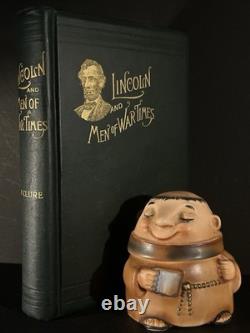
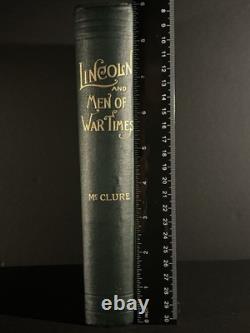
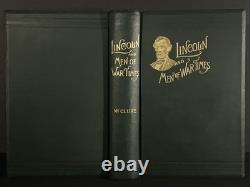
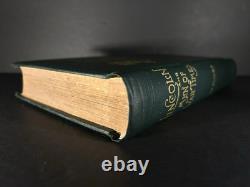
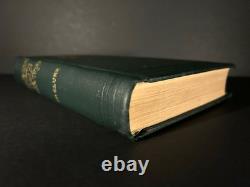

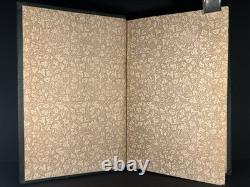
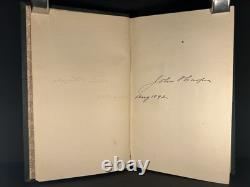
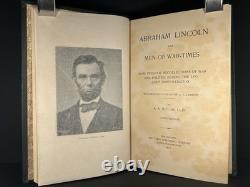
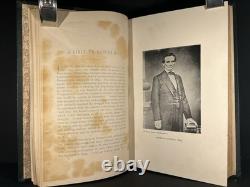
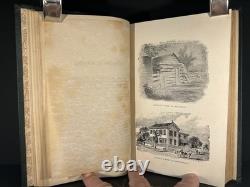
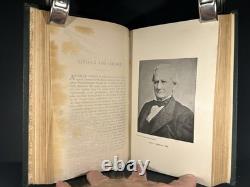
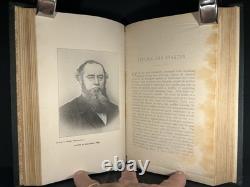
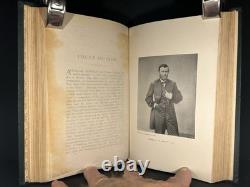
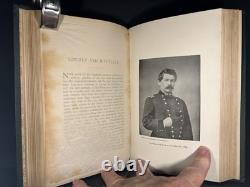
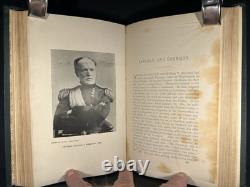
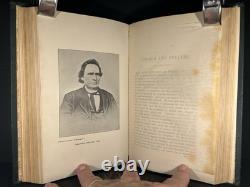
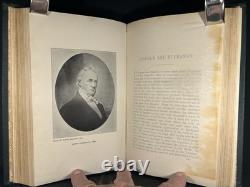
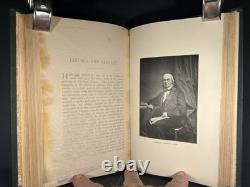
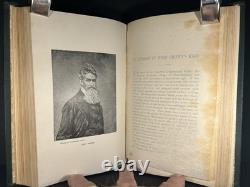
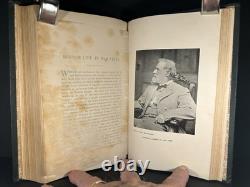
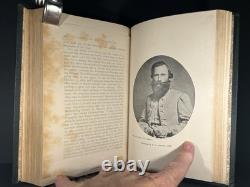
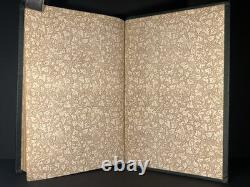


9" tall, 6 1/8" deep, 1 1/2 thick. Weight is Often an Indicator of the Quality Materials Used in a Book's Construction. This Book Weighs in at a Whopping. Note: Not all of The Times Publishing Company 1892 First Editions of this book were created equal.
When comparing this book to other available copies. Look for the presence (or absence of) decretive endpapers. Tissue guards protecting all of the photos, and the quality of paper used. Beautiful Gold Gilt and Embossed Binding. Illustrated With Dozens of Civil War Era Photographs of Politicians and Generals. Outstanding Condition, Other Than the Tissue Guards. Oiling throughout the spine and covers.There are NO cracks or fraying to the top and bottom edges of the spine. Exterior hinges are NOT cracked, remain quite functional and are holding extremely strong, like new. The four corners of the book show LITTLE to NO.
Bumping and remain sharp and square with NO cloth loss. The Gold Gilt on the spine and front cover remains BRIGHT and BRILLIANT with NO loss. The page edges are VERY LIGHTLY age toned with only a HINT of dust dulling along the top edge. The book stands straight and tall on its own and is NOT askew. At rest, the book does NOT pop open.
But closes tightly like new. The endpapers are a beautiful cream color with a bronze colored floral pattern throughout. The paste down portion of the front and rear endpapers are both holding firmly to the book covers, like new.
Both interior hinges are NOT cracked, remain. Quite functional and are holding extremely strong, like new. There is an ink signature dated 1892 on the first front flyleaf page.
The text block remains extremely tight, like new, with NO loose signatures (gatherings). There are NO pulls or separations within the text block. There are NO missing or loose pages throughout the book. There are NO torn pages throughout the book. The tissue guards throughout the book are in "like new" condition, however due to the acid in this tissue paper, they all show age toning or foxing (see photos).
He remaining pages throughout the book are crisp, very clean, very very lightly and very evenly age toned with NO. Foxing (see attached photos as an example--note how white and clean the pages are). The page corners remain sharp and square with NO folded pages.
There are NO library markings or personal book plates throughout the book. There are NO inscriptions throughout the book. Other than the signature (described above) there are NO other signs of pencil or ink throughout the pages of the book.
There are NO signs of water damage throughout the book. The book has NO smoke, mildew or other unusual odors. It appears as though this book was never read from cover to cover.
McCLURE (THE AUTHOR OF THIS BOOK). (January 9, 1828 - June 6, 1909) was an American politician, newspaper editor, and writer from.
From 1858 to 1859 and 1865 to 1866 as well as a member of the. He was a prominent supporter, correspondent, and biographer of President. He was the editor of the.Are named in his honor. McClure was born on January 9, 1828, in Sherman's Valley.
To Alexander and Isabella Anderson McClure. He grew up on a farm and received little formal education.
At the age of fourteen, he moved to Philadelphia, Pennsylvania and apprenticed as a tanner. He traveled west as far as Iowa.He worked as a printer at the Perry County Freeman and the Juniata Sentinel in Mifflintown, Pennsylvania. He became editor and publisher of the Sentinel in 1846, and became known for his Whig.
McClure was appointed to the staff of the first Whig governor of Pennsylvania, William F. With the honorary rank of colonel.
Appointed McClure deputy United States Marshal. He studied law and was admitted to the Franklin County, Pennsylvania. McClure became active in the newly formed Republican Party and was an outspoken abolitionist. In 1857, he was elected to the Pennsylvania House of Representatives. And re-elected in 1858 and 1859.
At the 1860 Republican National Convention. McClure became a well-known political figure, opposing fellow Pennsylvanian Simon Cameron. Helped swing the state's vote away from Cameron and William Seward.
After Lincoln's election, McClure became chairman of the Republican state committee and helped to elect Curtin governor of Pennsylvania. He served in the Pennsylvania Senate.
In 1861 and for the 4th district. When the Civil War began, McClure rallied support for the war as Chairman of the Senate Committee of Military Affairs. He assisted Governor Curtin in planning a meeting of fourteen Northern state governors known as the "Loyal War Governors of the North", in Altoona, Pennsylvania. In order to secure their continued support of the war. McClure was commissioned by President Lincoln as an assistant adjutant general with the rank of major on September 6, 1862. He was tasked with raising seventeen Pennsylvania regiments for induction into the U.And served until he resigned his commission on February 27, 1863. Confederate forces threatened McClure's home in Chambersburg several times. McClure was captured but released when General J.
Entered Chambersburg on his raid around McClellan's army in October 1862. The following July, Confederates under then Colonel Eppa Hunton. Crossed the Potomac River and destroyed railroad property in Chambersburg en route to the Battle of Gettysburg.
But noted McClure's hospitality. Days before the battle of Gettysburg. Confederate General Albert Jenkins was a guest at McClure's house. McClure personally met with Robert E.
During the second occupancy of Chambersburg by the Confederate army. In 1864, during the Confederacy's third occupation of Chambersburg, when the town was unable to pay ransom demanded by General Jubal Early. Confederates burned McClure's home, Norland along with much of the rest of the town.
The building that housed the Franklin Repository newspaper operations was also destroyed in the blaze. In 1864, McClure moved to Philadelphia, opened a law office. And helped Lincoln carry Pennsylvania again in the general election. In 1865, McClure was elected again to the Pennsylvania House of Representatives as a Union Party member. After the war, McClure traveled extensively in the Western United States to recoup personal wealth lost during the war.He became an investor and officer of the Philadelphia-based Montana Gold and Silver Mining Company and was superintendent of one of the company's mills at the Oro Cache vein in the Montana Territory. He also collaborated with former Pennsylvania Governor Andrew Curtin as an incorporator of the McClure-Curtin Oil Company in Venango County, Pennsylvania. At the Republican National Convention.
And the Liberal Republican Party. In 1867, McClure published Three Thousand Miles Through the Rocky Mountains and it became a resource by many interested in traveling in the West. In 1873, McClure was elected to the Pennsylvania Senate. He ran for mayor of Philadelphia.
But lost by only 900 votes. He lost much of his fortune in the stock market but was able to obtain an appointment as prothonotary. Of the Supreme Court of Pennsylvania. He also worked to heal sectional divisions between Union and former Confederate forces, including participating at the unveiling of the monument to Confederate General George Pickett.
In 1886 McClure wrote The South: Its Industrial, Financial, and Political Condition, which included material on race relations in the South. McClure recognized that integration was necessary. Gratz in 1879 after his first wife's apparent death. Together they had at least one son. McClure died on June 6, 1909, in Wallingford, Pennsylvania. And was buried at Laurel Hill Cemetery. The town of McClure, Pennsylvania.In Philadelphia are named in his honor. Three Thousand Miles Through the Rocky Mountains. The Annals of the Civil War.
New York: Da Capo Press, 1994. The South: Its Industrial, Financial, and Political Condition. Abraham Lincoln and Men of War Times: Some Personal Recollections of War and Politics during the Lincoln Administration. Philadelphia, The Times Publishing Company 1892. The Life and Services of Andrew G. Addresses, Literary, Political, Legal & Miscellaneous, Volume 2. Philadelphia: The Times Publishing Company, 1895. Lincoln's Yarns and Stories: A Complete Collection of the Funny and Witty Anecdotes That Made Abraham Lincoln Famous as America's Greatest Story Teller.The Authentic Life of William McKinley Our Third Martyr President: Together with a Life Sketch of Theodore Roosevelt. To the Pacific & Mexico. Famous American Statesmen & Orators, Past and Present: With Biographical Sketches and Their Famous Orations. Our Presidents and How We Make Them. McClure's Recollections of Half a Century.
The Salem Press Company, 1902. His recollections regarding the Harpers Ferry raid.
Appeared first in a newspaper. Old Time Notes of Pennsylvania. THE MAD MONK recognizes that vintage antique books are fragile. Therefore, his books are packaged with the utmost care to insure a safe journey to their new home.
Smaller and/or miniature books may be mailed in a padded envelope with other protective measures taken. THE MAD MONK'S PROMISE.
THE MAD MONK is an honest and fastidious friar. He attempts to point out all of the qualities as well as the flaws and imperfections in his books with the use of words and photos. In addition, feel free to reach out to THE MAD MONK if you have any questions or concerns about a particular book.Sorry, monk (in photo) not included. THE MAD MONK is only human and may on occasion overlook something. Save MAD MONK BOOKS as a FAVORITE. Watch for hundreds of new listings, as this fastidious friar finds time to list them.

